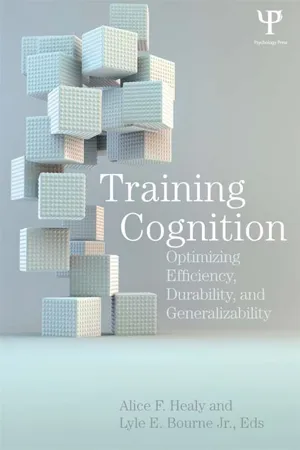
Training Cognition
Optimizing Efficiency, Durability, and Generalizability
- 360 pages
- English
- ePUB (mobile friendly)
- Available on iOS & Android
Training Cognition
Optimizing Efficiency, Durability, and Generalizability
About this book
Training is both a teaching and a learning experience, and just about everyone has had that experience. Training involves acquiring knowledge and skills. This newly acquired training information is meant to be applicable to specific activities, tasks, and jobs. In modern times, where jobs are increasingly more complex, training workers to perform successfully is of more importance than ever. The range of contexts in which training is required includes industrial, corporate, military, artistic, and sporting, at all levels from assembly line to executive function. The required training can take place in a variety of ways and settings, including the classroom, the laboratory, the studio, the playing field, and the work environment itself.
The general goal of this book is to describe the current state of research on training using cognitive psychology to build a complete empirical and theoretical picture of the training process. The book focuses on training cognition, as opposed to physical or fitness training. It attempts to show how to optimize training efficiency, durability, and generalizability. The book includes a review of relevant cognitive psychological literature, a summary of recent laboratory experiments, a presentation of original theoretical ideas, and a discussion of possible applications to real-world training settings.
Tools to learn more effectively

Saving Books

Keyword Search

Annotating Text

Listen to it instead
Information
Table of contents
- Front Cover
- Half Title
- Title Page
- Copyright
- Contents
- Preface
- 1 Introduction: Training and its Cognitive Underpinnings
- 2 Empirically Valid Principles of Training
- 3 Basic Research on Training Principles
- 4 Attention and Cognitive Resource Load in Training Strategies
- 5 Acquisition and Transfer of Basic Skill Components
- 6 How Cognitive Ability and Automation Influence Training Performance and Transfer
- 7 Conducting Technology-Based Applied Training Research
- 8 A New Taxonomy for Training
- 9 Cognitive Models of Training Principles and the Instance-Based Learning Tool
- 10 Modeling Cognitive Tasks in IMPRINT
- 11 Evaluation and Comparison of Models of Human Performance During Training
- 12 A Compact Mathematical Model for Predicting the Effectiveness of Training
- 13 Put the SPRINT in knowledge training: Training with SPacing, Retrieval, and INTerleaving
- 14 Training for Real-World Job Performance
- 15 Cognitive Retraining Following Acquired Brain Injury
- 16 Conclusions
- Index
Frequently asked questions
- Essential is ideal for learners and professionals who enjoy exploring a wide range of subjects. Access the Essential Library with 800,000+ trusted titles and best-sellers across business, personal growth, and the humanities. Includes unlimited reading time and Standard Read Aloud voice.
- Complete: Perfect for advanced learners and researchers needing full, unrestricted access. Unlock 1.4M+ books across hundreds of subjects, including academic and specialized titles. The Complete Plan also includes advanced features like Premium Read Aloud and Research Assistant.
Please note we cannot support devices running on iOS 13 and Android 7 or earlier. Learn more about using the app